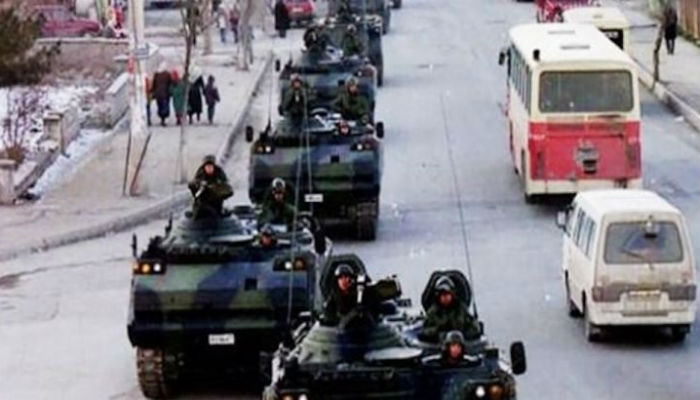An Ankara court on Friday sentenced 21 suspects, including a former chief of general staff and his deputy, to life in prison for their roles in the post-modern coup of February 28, 1997 following the issuance of a military memorandum.
However, the court did not rule to imprison them due to their advanced age, instead ruling for judicial supervision and a ban on traveling outside the country.
The court also ruled to acquit 68 others, while charges against four suspects who died during the judicial process were dropped. Among those sentenced to life in prison were then-Chief of General Staff Çevik Bir, Deputy Chief of General Staff İsmail Hakkı Karadayı and Operations Chief Çetin Doğan. President of the Higher Education Board (YÖK) at the time Kemal Gürüz was also sentenced to life.
The defendants plan to appeal to a higher court.
The 1997 campaign of army pressure against the government of Islamist Prime Minister Necmettin Erbakan, a political precursor to current President Recep Tayyip Erdoğan, stopped short of a full-blown coup. Still, the military pressure and the appearance of tanks in a town outside the capital, Ankara, have long rankled Erdoğan and members of his Islamist-rooted Justice and Development Party (AKP). Turkey saw violent coups in 1960 and in 1980, but under Erdoğan, who survived a putsch in 2016, the political strength of the military has been drastically rolled back.
Retired Gen. Karadayı, 85, who served as chief of general staff between 1994 and 1998, and deputy chief of general staff at the time Bir were among the suspects sentenced to life in prison. Both retired officers appeared before the judge at the sentencing hearing. The suspects were accused of “forming criminal associations to overthrow the government of the Republic of Turkey.”
According to a report by the Hürriyet Daily News, some 103 suspects were initially earmarked in the trial’s 1,300-page indictment, though the prosecutor had requested the acquittal of 39 defendants.
The case tackles the infamous military intervention of Feb. 28, 1997, often described as a “postmodern coup,” which did not result in direct military rule but forced the late Prime Minister Erbakan to resign after the National Security Council (MGK) issued a memorandum. The bloodless “postmodern” coup is famous for having deposed the head of government after tanks paraded outside Ankara and Erbakan was given an ultimatum.
Because the Islamist Erbakan-led government was forced out without the dissolution of parliament or the suspension of the constitution, the event was labeled a “postmodern coup” by members of the military involved in the process. To enforce the Feb. 28 MGK decisions, Gen. Bir founded and chaired the Batı Çalışma Grubu (West Study Group).
Erbakan, the conservative politician who led the coalition government, was forced to sign into law the army’s decisions on certain issues, such as a ban on headscarves for civil servants and the shutting down of Quran training schools. The military also ramped up pressure on Erbakan and his conservative Welfare Party (RP) over “secular concerns.”
Erbakan resigned four months later, while his RP and its successor, the Virtue Party (FP), were both banned by the Constitutional Court in January 1998 and June 2001, respectively. Erbakan, who died in 2011, pioneered Islamist politics in Turkey, a Muslim country with a secular state system, paving the way for the later success of Erdogan’s AKP. Current Turkish President Erdoğan was also involved in politics under Erbakan’s party and was elected as İstanbul mayor in 1994.
In 2013, Karadayı and Bir faced charges of helping to overthrow the Turkish government by force but were later released under judicial supervision. Another four defendants have died since the court case began in 2013.
(Stockholm Center for Freedom [SCF])
